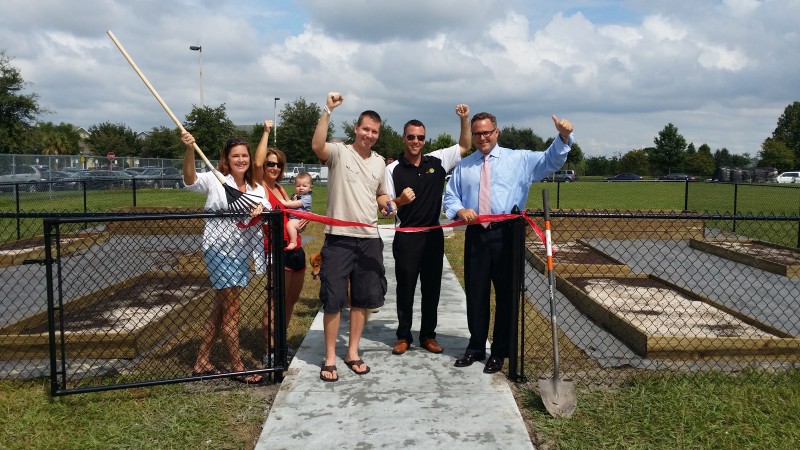Before Robert Bowden was director at Harry P. Leu Gardens, he was a newly employed teen at a Cleveland, Ohio garden center. The budding gardener would spend his lunch breaks walking up and down the rows of vegetation, taking vigorous notes. On days off, he and his father cultivated their large backyard into an informal botanical garden, complete with 47 clearly labeled trees. Fifty-five years later, Bowden still uses the same tried-and-true gardening techniques he began perfecting back then.
The Secrets to Gardening
Selecting the right plants is the key to avoiding unwelcome insect infestations, diseases and the resulting overuse of chemicals, he says. “If you get a plant but you don’t really consider that it needs full sun – and you don’t have full sun – the plant immediately goes into distress,”says Bowden. “You might as well ring the dinner bell. Insects know when a plant is in distress.”
He recommends analyzing any insects that make themselves at home in your garden. Getting to know what those bugs represent can give you an idea of anything that’s going wrong in your garden. “Something about that plant, the way it’s grown, needs to be altered. Maybe the sprinkler hasn’t been working and it’s dry and under stress. Maybe some mulch can help conserve water. Maybe a nearby tree fell and now it’s in full sun. When we see bugs, we don’t see bugs; we see it as a red flag.”
Maintaining a beautiful garden requires knowledge, and that comes with getting your hands dirty. “The secret to a green thumb is brown knees,” he says. “Even if you haven’t grown vegetables or trees before, you can do it. There’s no plant police out there. If you plant a bean and an animal eats it or you spray it and kill it by mistake or you water it and it dies, that’s OK. That’s how you learn. You have to get down on your hands and knees, get some dirt under your fingernails.”
Bowden warns gardeners never to water produce from rain barrel water, which can harbor more than 14 different kinds of viruses and bacteria, including E. coli and salmonella. However, you’ll be re-leafed to know you can still use your rain barrel on your lawn, shrubs or ornamentals, such as amaryllis, hibiscus, Southern Magnolia, ginger, bottlebrush, angel trumpets and roses, which are all great choices for an April garden, says Bowden.
How Does Your Garden Grow
If you’re looking to have a flower garden flourishing in your yard, Bowden recommends including drift roses, a rewarding variety that blooms in many shades, including yellow, white and apricot. “We are so lucky in Central Florida. Roses bloom year round and include every color of the rainbow,” says Bowden. “Roses often have a reputation for being difficult to grow, but the new varieties on the market have a high degree of insect and disease resistance.”
For an April vegetable garden, try planting mustard, okra, peanuts, southern peas, sweet potatoes or turnips, says Bowden, who encourages local gardening enthusiasts to visit Leu Gardens’ demonstration garden for ideas and sage advice from experts. “There are so many wonderful things we can grow and share, even I’m still learning. And it’s rewarding. There is an incredible amount of pride in individuals who grow their own food and bring it to the table.”
The Epcot International Flower & Garden Festival is another great source of information and ideas for local gardeners, says Heather Will-Browne, Walt Disney World horticulture area manager.
“A lot of our focus and knowledge revolves around what you can do at home,” she says. “Each Friday through Sunday of our 75-day festival, you can attend gardening talks by garden experts and how-to workshops at our Festival Center. Every festival day, you’ll have the chance to chat with cast members at our featured gardens where you can gather details about how to plant peppers, grow herbs and attract butterflies and other wildlife to your garden. At night, our illuminated gardens can give you ideas about how to light your own backyard landscape.”
A Community Project
A community garden is a fruitful way to grow healthy food even if you don’t have a backyard, says Jeff Loeffert of Windermere, who initiated a 10-bed, wheelchair-accessible community garden in his neighborhood of Summerport. “Our community garden is a place to grow natural food in the presence of friends and neighbors,” he says. “Many of the beds are utilized by folks who don’t have space, town homes or landlords who won’t let them have a garden, so it’s a terrific opportunity for them to have their own garden.”
The garden, which opened a few months ago, received immediate occupancy and currently has a waiting list as beds become available. Twenty-five percent of the excess produced is also donated to local food banks. “We’ve had such a great response and such a terrific array of vegetables,” says Loeffert. “The garden builds a sense of community as neighbors and celebrates our diversity as individuals. We learn from each other and form friendships. The next thing you know, you’re playing tennis together and going to dinner together. It’s wonderful.”
The neighborhood children are also benefiting from the garden. “The location of the bed is a home run, as it is situated right next to an elementary school,” Loeffert says. “Many children and their parents/grandparents like to visit the garden every day on their way to school, stopping by to see the differences in the plants as they morph and grow. The kids get so excited to see the blossoms on the plants. It is so rewarding as a parent to see kids develop an interest in gardening at such an early age.”
Will-Browne agrees with this sentiment. “Children are our future, [and gardening] connects them to the earth. They need to know how we get our food and how we interact with the environment. It would be impossible to even begin to list all of the lessons you can learn in a garden.”




Comments